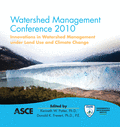Evaluating the Potential Effects of Climate Change on Thermal Discharges to a Large-Scale River
Publication: Watershed Management 2010: Innovations in Watershed Management under Land Use and Climate Change
Abstract
Large-scale rivers receive thermal discharges from a variety of sources including electric power plants. This thermal loading dissipates downstream, primarily via radiation, and convective and evaporative heat transfer to the atmosphere. Thermal discharges are typically regulated under the Clean Water Act National Pollutant Discharge Elimination System (NPDES) permit program. The discharge permits usually specify a maximum allowable increase in river temperature due to the discharge, often with the additional criteria of a maximum allowable river temperature. Permit compliance issues are often most critical during summer drought conditions, when the electrical production (and attendant cooling water discharge) is at maximum, ambient river temperatures are high, and river flow is low. Potential climate change could significantly alter the climate and hydrologic variables that are critical to dissipation of thermal loading, and regulation of thermal discharges. Changes in air temperature, humidity, and insolation could directly affect river temperature. Changes in precipitation depth and pattern could alter river low flow characteristics. Further, land-use changes, particularly in agricultural areas, could alter rainfall-runoff response from that which occurs at present. These issues were explored on a large-scale river through use of a hydraulic and energy balance model. The model reach extended for over 200 miles. Historical climate and river flow and temperature data were used to verify model results. Conditions of future climate change were evaluated by downscaling regional climate model projections to locations in the watershed, and using those results to alter the climatic input data to the river of thermal model. Potential changes in river low flow characteristics were evaluated via sensitivity analysis on historical low flows, due to the complexity of land-use/precipitation patterns/runoff rate interaction. The resulting "potential future scenarios" were used to evaluate changes in compliance to typical permit conditions. The analysis indicates that thermal discharge permit compliance could be significantly affected by future climate change conditions. The analysis also suggests additional analyses that would be appropriate to develop a comprehensive strategy for managing thermal loading under climate change conditions.
Get full access to this article
View all available purchase options and get full access to this chapter.
Information & Authors
Information
Published In
Copyright
© 2010 American Society of Civil Engineers.
History
Published online: Apr 26, 2012
ASCE Technical Topics:
- Business management
- Climate change
- Climates
- Engineering fundamentals
- Engineering mechanics
- Environmental engineering
- Hydrologic engineering
- Legal affairs
- Measurement (by type)
- Permits
- Pollution
- Practice and Profession
- River engineering
- Rivers and streams
- Stress (by type)
- Structural analysis
- Structural engineering
- Temperature effects
- Temperature measurement
- Thermal analysis
- Thermal loads
- Thermal pollution
- Thermodynamics
- Water and water resources
- Water discharge
Authors
Metrics & Citations
Metrics
Citations
Download citation
If you have the appropriate software installed, you can download article citation data to the citation manager of your choice. Simply select your manager software from the list below and click Download.
